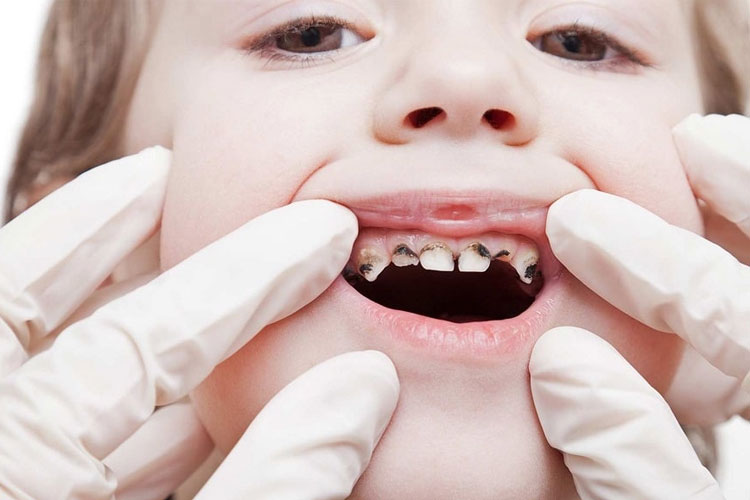Tooth decay is a common dental problem that occurs when bacteria in the mouth produce acids that erode the enamel of the teeth. This can lead to cavities, tooth sensitivity, and other oral health issues. While tooth decay can affect people of all ages, it is particularly common in children, teens, and older adults. Understanding the causes, symptoms, and treatment options for tooth decay is essential for maintaining good oral health and preventing serious dental problems down the line.
Causes of Tooth Decay: The Role of Bacteria and Acids
The primary cause of tooth decay is the presence of bacteria in the mouth that produce acids that erode the enamel of the teeth. This can be exacerbated by factors such as poor oral hygiene, a diet high in sugar and starch, dry mouth, and certain medical conditions. Over time, the erosion of the enamel can lead to the formation of cavities, which can cause pain, sensitivity, and other oral health issues. By understanding the underlying causes of tooth decay, individuals can take steps to prevent it from occurring and maintain good oral health.
Symptoms of Tooth Decay: How to Recognize the Signs

The symptoms of tooth decay can vary depending on the severity of the condition. In the early stages, tooth decay may not cause any noticeable symptoms. However, as it progresses, individuals may experience tooth sensitivity, pain when chewing or biting, visible pits or holes in the teeth, and discolouration or staining of the teeth. If you are experiencing any of these symptoms, it is important to seek professional dental care as soon as possible to prevent further damage and complications.
Prevention of Tooth Decay: Tips for Maintaining Good Oral Hygiene
Preventing tooth decay starts with maintaining good oral hygiene habits. This includes brushing and flossing regularly, using mouthwash, and visiting the dentist for regular cleanings and checkups. Additionally, avoiding sugary and starchy foods and drinks, drinking plenty of water, and using fluoride toothpaste can all help to prevent tooth decay and maintain good oral health over time.
Treatment Options for Tooth Decay: Fillings, Crowns, and Root Canals

Fillings
Fillings are a common treatment for minor cavities caused by tooth decay. During the procedure, the dentist will remove the decayed portion of the tooth and fill it with a material such as composite resin, amalgam, or gold. The filling material is then shaped and polished to restore the tooth’s natural function and appearance. Fillings are a quick and effective way to repair minor tooth decay and prevent further damage to the tooth.
Crowns
Crowns are a more extensive restoration option for teeth that have been severely damaged by tooth decay or other dental problems. During the procedure, the dentist will remove the damaged portion of the tooth and place a custom-made crown over the remaining tooth structure. Crowns are typically made of porcelain, ceramic, or metal and can be designed to match the color and shape of the natural teeth. Crowns are a durable and long-lasting option for restoring severely decayed teeth.
Root Canals
Root canals are a treatment option for teeth that have been severely damaged by tooth decay or other dental problems that have affected the tooth’s inner pulp. During the procedure, the dentist will remove the damaged pulp and replace it with a filling material. The tooth is then sealed with a crown or filling to restore its function and appearance. Root canals are a highly effective way to save damaged teeth and prevent further decay or infection. While root canals are often associated with pain and discomfort, modern techniques and anaesthesia make the procedure relatively pain-free for most patients.
Complications of Untreated Tooth Decay: Why Prompt Treatment is Important
Untreated tooth decay can lead to a variety of complications, including infections, abscesses, and even tooth loss. Additionally, it can affect overall health and well-being by causing pain, discomfort, and difficulty eating or speaking. Prompt treatment is essential for preventing these complications and restoring oral health and function.
When to See a Dentist: Guidelines for Seeking Professional Care
It is important to see a dentist as soon as possible if you are experiencing any symptoms of tooth decay or other dental problems. Additionally, individuals should seek professional dental care at least twice a year for routine cleanings and checkups to maintain good oral health and prevent serious dental problems from occurring.
Maintaining good oral health is essential for overall health and well-being. By understanding the causes, symptoms, and treatment options for tooth decay, individuals can take steps to prevent it from occurring and restore their oral health and function. Prioritizing oral health through regular dental care and good oral hygiene habits can help individuals achieve a brighter smile and better overall health for years to come.
If you’re experiencing symptoms of tooth decay or other dental problems, it’s important to seek professional care as soon as possible. At Shanta Medical Centre in Mumbai, our experienced dentists offer a range of dental services to help you maintain good oral health and a bright, healthy smile.
Our team uses the latest techniques and technology to provide safe, effective, and pain-free treatments for all types of dental problems, including tooth decay. Whether you need a routine check-up, a filling, a crown, or a root canal, our team is here to help. Contact us today to schedule an appointment and take the first step toward better oral health.

